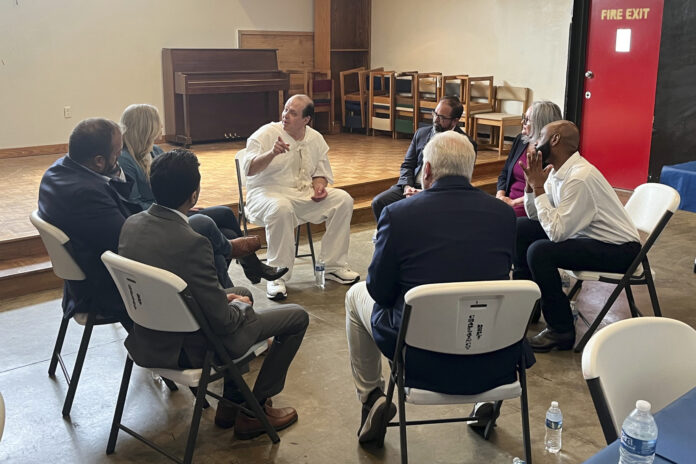Thursday night, the Texas Supreme Court handed down a Excellent order Saving Robert Roberson from execution – but probably not for long.
In 2003, Roberson was convicted of murdering her daughterShaken baby syndrome” However, in an extraordinary turn of events, it appears that Roberson is innocent. Not only that, but so is his daughter. There were even victims of murder in the first place.
One reason to doubt the conviction is that modern science views shaken baby syndrome with increasing skepticism. More importantly, however, the evidence in Roberson’s case suggests that her poor girl actually died from a combination of pneumonia and drugs that should never have been prescribed to such a young patient, and that the injuries that the 2003 jury found to be child abuse. May result from surgery.
Another reason to order In the Texas House of Representatives It is so extraordinary that it could be an unprecedented conflict between the state legislature and its governor. Texas Gov. Greg Abbott (R) has the power to issue a 30-day stay of execution for Roberson (even if he is not granted a permanent pardon) but has so far declined to do so, and the state plans to execute Roberson on Thursday night.
The day before, however, a bipartisan group of state lawmakers issued a subpoena Roberson is seeking testimony before a committee of the state House of Representatives. That hearing isn’t scheduled until Monday, and Roberson apparently couldn’t comply with the subpoena if he was killed Thursday night.
Roberson’s case therefore raises what may be a unique separation of powers issue under the Texas Constitution: Can the executive branch of Texas government execute an otherwise lawful death penalty if doing so prevents its legislative branch from hearing testimony from a witness it has already subpoenaed?
Robinson’s case has proven divisive within Texas’ Republican-controlled government
By order of the Supreme Court of Texas Texas House No word on whether Roberson is innocent. In fact, the state Supreme Court isn’t usually allowed to hear criminal appeals—those are handled by an entirely separate court known as the Texas Court of Criminal Appeals, which has repeatedly denied Roberson relief. The state Supreme Court has not definitively ruled on whether a House subpoena can stop executions.
Instead, in an opinion concurring with two other justices, Justice Evan Young explained that he voted to temporarily stay Roberson’s death sentence to give the court time to determine what might happen in unusual circumstances when the Legislature seeks testimony from someone. A death row inmate on the eve of his execution.
“We have no clear precedent on this question,” Young wrote, which is surprising given the highly unlikely circumstances in which this case came before his court.
Two other aspects of the case are worth noting. One is that the case has pitted several state Republicans against each other. Although Abbott, who has yet to intervene on behalf of Roberson, is a Republican, So are two Texas lawmakers who introduced the resolution to subpoena Roberson. Every justice on the Texas Supreme Court is Republican, as is every judge on the Court of Criminal Appeals, which recently voted 5-4 to deny relief to Roberson.
The flip side is that Roberson’s fate likely depends on the Texas Board of Pardons and Paroles, which already Wednesday voted once not to recommend clemency for him. If the board recommends clemency, Abbott could commute Roberson’s death sentence altogether. But without a clemency recommendation, Abbott can only delay the execution for 30 days.
For now, Roberson’s attorneys are trying to buy him time. At most, the legislative subpoena could prevent Texas from rescheduling his death sentence until after Monday, when he is scheduled to testify. It will then likely be up to Abbott to give him another 30 days to convince the pardon board to reverse its decision.
But the amazing thing about this case is that virtually everyone who touches it wants Roberson to live except the Texas government (Court of Criminal Appeals, Board of Pardons and Abbott) who actually has the power to save. One of Roberson’s attorneys is Brian Wharton, The The lead detective on his case who now believes he is innocent.
Another is U.S. Supreme Court Justice Sonia Sotomayor, who wrote a 10-page statement that the U.S. Supreme Court is unable to intervene because Roberson does not claim that any of his rights under federal law are being violated. Still, while Sotomayor agreed that he was powerless because Roberson “presents no cognizable federal claim,” his statement Virtually begs state officials who might actually save Roberson’s life.
“A thirty-day executive revocation would provide the Texas Board of Pardons and Paroles with an opportunity to reconsider evidence of Roberson’s actual innocence,” Sotomayor wrote at the end of that statement. “It may prevent a miscarriage of justice from occurring: the death penalty of a person who has produced credible evidence of actual innocence.”


